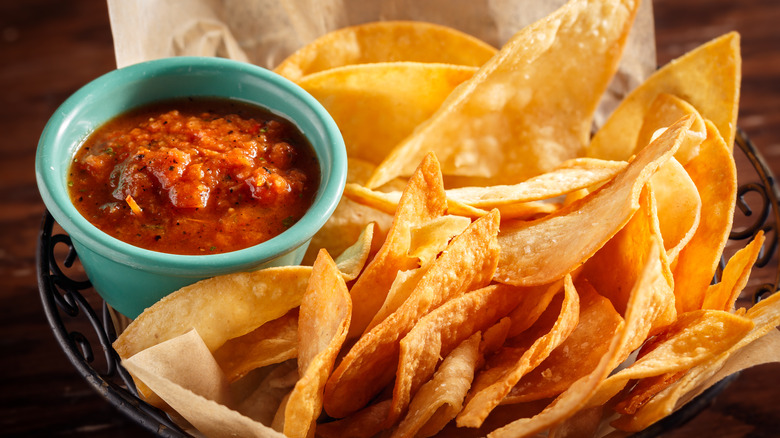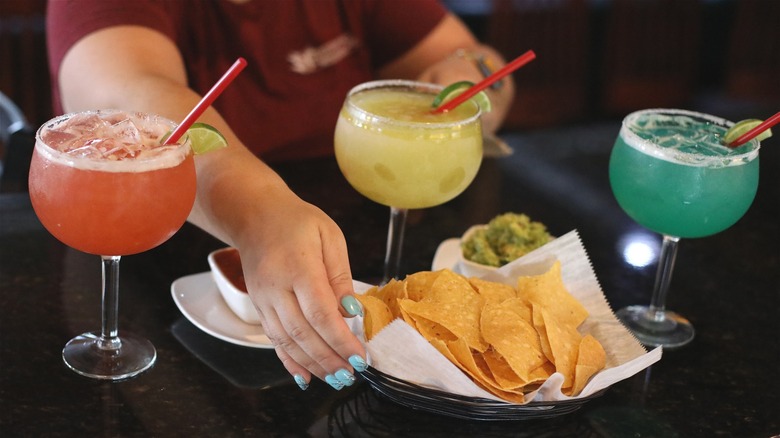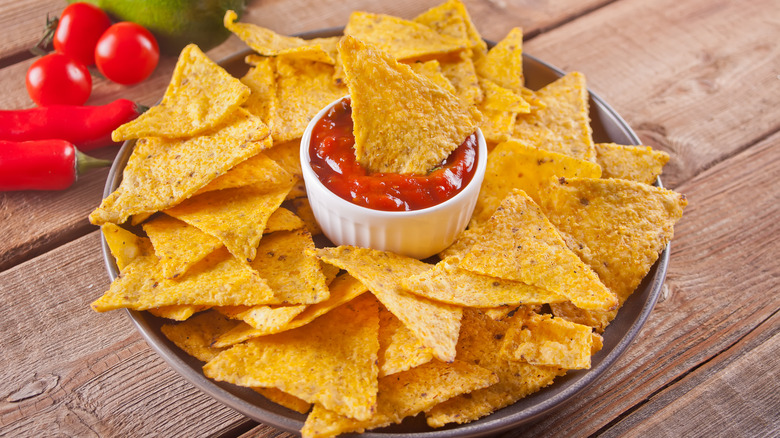Why Mexican Restaurants Don't Charge For Chips And Salsa
When you visit a Mexican restaurant, the presumption is that you'll be served free chips and salsa before your meal. Part of the experience is enjoying these freebies while perusing the menu and deciding what to get for your main course. Far from filling you up before your order arrives, they tend to have the opposite effect of stimulating your hunger and thirst, perhaps in anticipation of the food to come. If you've ever wondered why restaurants don't charge for these complimentary pre-meal snacks, or how they can afford to do so, the answers have as much to do with psychology as they do gastronomy.
The French word lagniappe is a familiar term in Louisiana meaning a gift or something extra provided by a business to its customers. In the restaurant world, this usually indicates a free appetizer or sides included with a meal — like bread and butter or a baked potato served alongside steak. The word actually comes from the Spanish "la ñapa," which in turn derives from the Quechua word "yapay," meaning a bonus or something added. Which is all rather ironic when you consider that in Mexico, it is not customary for chips and salsa to be served gratis.
In the United States, however, restaurants usually provide free starters to meet customers' expectations and remain competitive. It speaks to our perception of value by giving us more for what we pay, fostering loyalty and good vibes, and gives businesses the opportunity to upsell more expensive items.
Free chips and salsa at Mexican restaurants explained
That basket of chips and dip is the perfect opportunity for a restaurant's waitstaff to upsell you on other items, especially drinks. The salty, starchy, and spicy combo of corn tortilla chips and picante salsa makes you feel thirsty. While there's no direct profit to be made by giving you these for free, the establishment is counting on your party purchasing beverages ... all the better if you order higher priced cocktails like margaritas, pina colada, cerveza michelada, or non-alcoholic specialties like agua fresca or Mexican horchata. The happier you are with a bottomless supply of something tasty to nibble on, the longer you're likely to linger and order more booze.
Rather than making you feel too full, eating chips and salsa can act to whet your appetite. A well-trained server can take advantage of this situation by properly timing their descriptive spiel of what appetizers or daily specials are available, convincing you to order more than you had initially planned on. It's a win-win situation where you get to try more of what the restaurant has to offer, and they get to present you with a higher total on your check.
Having something to nosh on as you wait for your meal also keeps you from getting too peckish or impatient while the kitchen prepares your food. It's good hospitality, and your server is probably relying on this small extra adding to your overall experience and translating into a generous gratuity.
Freebies help restaurants remain competitive
Happy diners not only leave good tips, but they also tend to become return customers. In the highly competitive food industry, little gestures like a free serving of chips and salsa can make or break a business. Times are changing, and especially in today's post-pandemic economy, people are more frugal with how much they are willing to spend when eating out, and restaurants also face the rising costs of keeping things running. While there is a growing trend of some restaurants beginning to charge for chips and salsa, time will tell if that's a sustainable business model.
By charging for what most people expect to get free, business owners run the risk of angering customers, many of who turn to the internet to publicly air their complaints. This again relates back to the perception of value ... why would someone want to pay for something that was previously included at no charge? To cover costs while attempting to not lose customers and be given the Yelp kiss of death, rather than charge for chips and salsa, some restaurants opt to factor their higher costs into other menu item prices.
Businesses that continue to offer complimentary munchies may find that they have a leg up on their competition which adds a charge. Visiting your favorite Mexican restaurant that makes its own fresh tortilla chips and good quality homemade salsa can be enough to justify the higher price of dining out, especially when the lagniappes remain free.



